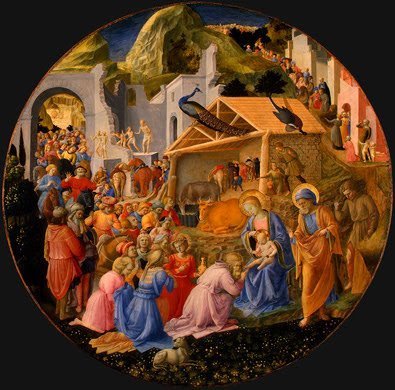"I meet you, O Christ, face to face. I see you in your Sacraments." Saint Ambrose (Photo of Haditha Dam, Iraq.)
Sunday, January 13, 2019
Sanctae Familiae Mariae Jesu Joseph: God was subject to man
From the Holy Gospel according to Luke
Luke 2:42-52
And when he was twelve years old, they going up into Jerusalem, according to the custom of the feast, And having fulfilled the days, when they returned, the child Jesus remained in Jerusalem; and his parents knew it not. And so on.
Homily of St. Bernard Abbot
Homilia super Missus est, n. 7-8
And he was subject unto them. Who was subject? And to whom? God to man! God, I repeat, to whom the Angels are subject, whom the Principalities and Powers do obey, was subject to Mary; and not only to Mary, but to Joseph also for Mary's sake. Marvel, therefore, both at God and man, and choose that which giveth greater wonder, whether it be the most loving condescension of the Son, or the exceeding great dignity of his Mother. Both amaze us, both are marvellous. That God should obey a woman is lowliness without parallel, that woman should rule over God, an elevation beyond comparison. In praise of virgins it is sung of them alone, that they follow the Lamb whithersoever he goeth. Of what praise do ye judge that woman to be worthy who is thus placed before the Lamb of God.
Saturday, January 5, 2019
In Epiphania Domini: "the Gentiles without, being as brutes, are roused not by a voice, but by a sign, that is, a star."

Homily by Pope St. Gregory the Great.
10th on the Gospels.
Dearly beloved brethren, hear ye from the Gospel lesson how, when the King of heaven was born, the king of earth was troubled? The heights of heaven are opened and the depths of earth are stirred. Let us now consider the question, why, when the Redeemer was born, an angel brought the news to the shepherds of Judea, but a star led the wise men of the East to worship Him. It seemeth as if the Jews as reasonable creatures received a revelation from a reasonable being, that is, an angel, but the Gentiles without, being as brutes, are roused not by a voice, but by a sign, that is, a star. Hence Paul hath it: a sign, not to them that believe, but to them that believe not but prophesying serveth not for them that believe not, but for them which believe. 1 Cor. xiv. 22. So the prophesying, that is, of the angel was given to them that believed, and the sign to them that believed not.
Thus also we remark that afterwards the Redeemer was preached among the Gentiles not by Himself, but by His Apostles, even as, when a little Child, He is shown to them, not by the voice of angels, but merely by the vision of a star. When He Himself had begun to speak He was made known to us by speakers, but when He lay silent in the manger, by that silent testimony in heaven. But whether we consider the signs which accompanied His birth or His death, this thing is wonderful, namely, the hardness of heart of the Jews, who would not believe in Him either for prophesying or for miracles.
All things which He had made, bore witness that their Maker was come. Let me reckon them after the manner of men. The heavens knew that He was God, and sent a star to shine over where He lay. The sea knew it, and bore Him up when He walked upon it. The earth knew it, and quaked when He died. The sun knew it, and was darkened. The rocks and walls knew it, and rent at the hour of His death. Hell knew it, and gave up the dead that were in it. And yet up to this very hour the hearts of the unbelieving Jews will not acknowledge that He to Whom all nature testified is their God, and, being more hardened than the rocks, refuse to be rent by repentance.
Tuesday, January 1, 2019
Circumcision of the Lord
From the Sermons of Pope St. Leo the Great.
7th for Christmas
Dearly beloved brethren, whosoever will keep truly and honour piously this day's festival, it is necessary for him neither to think falsely of the Lord's Incarnation, nor meanly of the Lord's Godhead. For as there is danger, on the one hand, of denying the truth of Christ's participation of our nature, so is there no less danger, on the other, of doing despite to the equality of His glory with the glory of the Father. Wherefore, when we draw near to understand the mystery of Christ's Birth, wherein He was born of the Virgin Mary, we must leave the clouds of earthly imagination behind and pierce the fog of human wisdom with the eye of enlightened faith.
V. But thou, O Lord, have mercy upon us.
R. Thanks be to God.